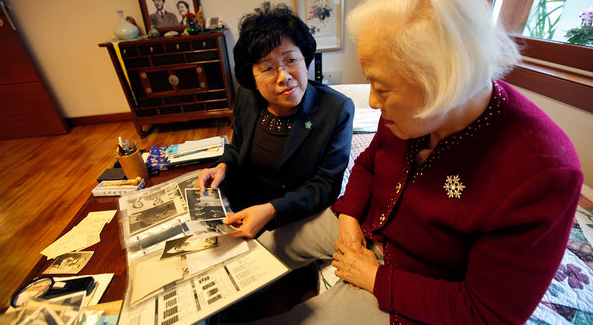이름: 관리자
2012-02-10 14:43:50 | 조회: 4825
----------------------------------------------------------------------------------------------------
Lee Mi-il, left, with her mother, Kim Bok-nam; her father was abducted during the Korean War. /By CHOE SANG-HUN
----------------------------------------------------------------------------------------------------
SEOUL, South Korea — On a sidewalk in central Seoul recently, Lee Mi-il and several other older South Koreans took turns at a microphone, calling out what seemed like an endless list of names. They began in the morning and continued through the night, announcing one name after another — 83,000 in all — their voices ringing out and melting into the cacophony of the city’s busiest district.
A few young pedestrians paused at this unusual demonstration. But most paid little attention.
The scene could have been a metaphor for Ms. Lee’s struggle of more than a decade.
Since 2000, Ms. Lee has campaigned to generate more interest in the fate of tens of thousands of South Koreans believed to have been forcibly taken to North Korea during the Korean War six decades ago. She has been demanding that the government negotiate for the return of those who may still be alive and the remains of those who are not. Government officials have never made that issue a priority when they have sat down with their North Korean counterparts, treating her campaign as a distraction from what they consider a more important task: persuading the North to abandon its nuclear weapons.
But Ms. Lee, 62, is not giving up, and recently she has scored some victories against what she calls “a gigantic darkness and forgetfulness.”
“We shout our fathers’ names because our society no longer remembers them,” she said during an interview in her office, where one wall is covered with the black-and-white photographs of people believed to have been abducted during the war, including her own father. “We hope that they will hear us and know that they are remembered.”
During the 1950-53 war, North Korea abducted tens of thousands of South Korean civilians, mainly civil servants, educators, writers, judges, Christian pastors and businesspeople. Nearly all were men. Some of their names appear in South Korean textbooks that describe their roles in building the young Korean state as it emerged from Japanese colonial rule. According to family accounts and the government, the North Koreans often seemed to have a clear idea of which people they wanted to move to the North, apparently to bolster their own professional ranks for reconstruction after the war or, in other cases, to neutralize enemies, like members of anti-Communist, right-wing groups.
When Ms. Lee’s father, a factory owner in Seoul, was taken away, she was 18 months old and ailing. A spinal injury left her with a warped back
When she speaks, her voice is little more than a raspy whisper, and she is only 4 feet 5 inches tall. But a smile seldom leaves her face.
“During air raids, Mother said I screamed endlessly in the underground shelter,” she said. “That ruined my vocal cords.”
When the American military signed a truce with North Korea in 1953, prisoners of war were exchanged, but civilian abductees were excluded. Their fate and the sorrow of the women they left behind lived on in a once-popular song:
Hands trussed with a steel wire,
my love looked back as he was dragged away,
barefoot and limping.
Even if it takes 10, or 100 years,
please return home alive.
But under the cold-war-era dictatorship in the South, the women were barred from staging street protests. They were kept under surveillance out of fear that North Korea might send back their relatives as spies. Often their sons were taken in for interrogation by counterintelligence agents looking for any evidence of treason.
As the years passed, many older people abandoned hope of ever striking a deal with the North, and younger generations have been eager to move on. Many families gave up hope that their relatives were still alive, or feared that activism on their behalf might only endanger them in the North.
Ms. Lee, who is divorced with no children, was running a nursery in Seoul in 2000 when she decided to break her long silence.
That year, President Kim Dae-jung of South Korea and Kim Jong-il, the North Korean leader, held the first summit meeting between the two Koreas. When their governments later arranged reunions of families separated by the war, abductees were once again excluded.
In the years that followed, South Korea provided billions of dollars in aid, hoping that would encourage more humanitarian gestures by the North. But the government in the North has not released any information about the missing South Koreans or allowed communication between relatives, insisting that any intellectuals from the South who ended up in the North did so voluntarily. It calls Ms. Lee’s campaign “a grave political provocation.”
“They never admit kidnapping because that would be admitting a crime,” Ms. Lee said. “They just hope we’ll all be dead soon and this will all be forgotten.”
In 2000, she shut down her nursery and established the Korean War Abductees’ Family Union, bringing together 700 families.
In 2002, her group found a 1952 government document listing 83,000 South Koreans as kidnapped, a preliminary wartime compilation that officials had previously denied existed. It was gathering dust, uncataloged, in a government library.
On its Web site, her group posts videotaped interviews with the aging wives and mothers whose firsthand accounts of the war would otherwise be lost with their deaths.
Last year, after seven years of lobbying by her group, lawmakers passed a bill authorizing the first government investigation of wartime kidnappings. In August, the government panel confirmed 55 men as kidnapped. More such rulings are expected during its four-year inquiry. To Ms. Lee, the official recognition was a first step toward establishing a “systematic war crime” by North Korea.
According to South Korean government estimates, Communist troops and militias killed 59,000 to 122,800 South Korean civilians during the war.
South Korean troops and police officers carried out similar massacres of civilians who were suspected of being leftists, according to recent government investigations. It remains unclear how many people were killed in mass executions in North Korea. However, during their short-lived advance into the North, American and South Korean troops discovered mass graves of civilians, including women and children, apparently killed in haste by retreating Communists.
Also unclear is what happened to those South Koreans taken to the North.
Kim Yong-il, who was abducted and then escaped from North Korea during the war, said that 600 of the 3,000 South Koreans he was forced to join in a “death march” did not make it to Pyongyang, the North’s capital, falling victim to hunger, disease and aerial bombings.
“Young people must know that the prosperity they enjoy today is built upon the sacrifices of these forgotten people,” Ms. Lee said. “Forgetting is ingratitude, the worst sin.”
This year, a few cabinet ministers began wearing blue lapel pins in the shape of a flower, the forget-me-not, that Ms. Lee’s group is distributing as part of its awareness campaign.
She has also taken her campaign to the United States, where some Korean families immigrated to escape political surveillance and poverty at home. They are appealing for a resolution by the United States Congress calling for the return of their relatives from North Korea.
“Although we are grateful to the Americans for defending our nation during the war, we are disappointed with their failure to free those kidnapped people during the armistice talks,” Ms. Lee said. “Many of the families are now American citizens. So it’s an American issue.”
When her group staged a rally in April, to recite the names of the abductees, Ms. Lee’s mother, Kim Bok-nam, 89, was the first to take the microphone. With a trembling voice, she started with the name of her own husband, Lee Seong-hwan, who, if he were still alive, would be 91.
Ms. Kim never remarried. Two of her three daughters immigrated to the United States, but she and Ms. Lee remain in the old family house.
“Mother believes that if Father returned, he would come to this house,” Ms. Lee said.
Lee Mi-il, left, with her mother, Kim Bok-nam; her father was abducted during the Korean War. /By CHOE SANG-HUN
----------------------------------------------------------------------------------------------------
SEOUL, South Korea — On a sidewalk in central Seoul recently, Lee Mi-il and several other older South Koreans took turns at a microphone, calling out what seemed like an endless list of names. They began in the morning and continued through the night, announcing one name after another — 83,000 in all — their voices ringing out and melting into the cacophony of the city’s busiest district.
A few young pedestrians paused at this unusual demonstration. But most paid little attention.
The scene could have been a metaphor for Ms. Lee’s struggle of more than a decade.
Since 2000, Ms. Lee has campaigned to generate more interest in the fate of tens of thousands of South Koreans believed to have been forcibly taken to North Korea during the Korean War six decades ago. She has been demanding that the government negotiate for the return of those who may still be alive and the remains of those who are not. Government officials have never made that issue a priority when they have sat down with their North Korean counterparts, treating her campaign as a distraction from what they consider a more important task: persuading the North to abandon its nuclear weapons.
But Ms. Lee, 62, is not giving up, and recently she has scored some victories against what she calls “a gigantic darkness and forgetfulness.”
“We shout our fathers’ names because our society no longer remembers them,” she said during an interview in her office, where one wall is covered with the black-and-white photographs of people believed to have been abducted during the war, including her own father. “We hope that they will hear us and know that they are remembered.”
During the 1950-53 war, North Korea abducted tens of thousands of South Korean civilians, mainly civil servants, educators, writers, judges, Christian pastors and businesspeople. Nearly all were men. Some of their names appear in South Korean textbooks that describe their roles in building the young Korean state as it emerged from Japanese colonial rule. According to family accounts and the government, the North Koreans often seemed to have a clear idea of which people they wanted to move to the North, apparently to bolster their own professional ranks for reconstruction after the war or, in other cases, to neutralize enemies, like members of anti-Communist, right-wing groups.
When Ms. Lee’s father, a factory owner in Seoul, was taken away, she was 18 months old and ailing. A spinal injury left her with a warped back
When she speaks, her voice is little more than a raspy whisper, and she is only 4 feet 5 inches tall. But a smile seldom leaves her face.
“During air raids, Mother said I screamed endlessly in the underground shelter,” she said. “That ruined my vocal cords.”
When the American military signed a truce with North Korea in 1953, prisoners of war were exchanged, but civilian abductees were excluded. Their fate and the sorrow of the women they left behind lived on in a once-popular song:
Hands trussed with a steel wire,
my love looked back as he was dragged away,
barefoot and limping.
Even if it takes 10, or 100 years,
please return home alive.
But under the cold-war-era dictatorship in the South, the women were barred from staging street protests. They were kept under surveillance out of fear that North Korea might send back their relatives as spies. Often their sons were taken in for interrogation by counterintelligence agents looking for any evidence of treason.
As the years passed, many older people abandoned hope of ever striking a deal with the North, and younger generations have been eager to move on. Many families gave up hope that their relatives were still alive, or feared that activism on their behalf might only endanger them in the North.
Ms. Lee, who is divorced with no children, was running a nursery in Seoul in 2000 when she decided to break her long silence.
That year, President Kim Dae-jung of South Korea and Kim Jong-il, the North Korean leader, held the first summit meeting between the two Koreas. When their governments later arranged reunions of families separated by the war, abductees were once again excluded.
In the years that followed, South Korea provided billions of dollars in aid, hoping that would encourage more humanitarian gestures by the North. But the government in the North has not released any information about the missing South Koreans or allowed communication between relatives, insisting that any intellectuals from the South who ended up in the North did so voluntarily. It calls Ms. Lee’s campaign “a grave political provocation.”
“They never admit kidnapping because that would be admitting a crime,” Ms. Lee said. “They just hope we’ll all be dead soon and this will all be forgotten.”
In 2000, she shut down her nursery and established the Korean War Abductees’ Family Union, bringing together 700 families.
In 2002, her group found a 1952 government document listing 83,000 South Koreans as kidnapped, a preliminary wartime compilation that officials had previously denied existed. It was gathering dust, uncataloged, in a government library.
On its Web site, her group posts videotaped interviews with the aging wives and mothers whose firsthand accounts of the war would otherwise be lost with their deaths.
Last year, after seven years of lobbying by her group, lawmakers passed a bill authorizing the first government investigation of wartime kidnappings. In August, the government panel confirmed 55 men as kidnapped. More such rulings are expected during its four-year inquiry. To Ms. Lee, the official recognition was a first step toward establishing a “systematic war crime” by North Korea.
According to South Korean government estimates, Communist troops and militias killed 59,000 to 122,800 South Korean civilians during the war.
South Korean troops and police officers carried out similar massacres of civilians who were suspected of being leftists, according to recent government investigations. It remains unclear how many people were killed in mass executions in North Korea. However, during their short-lived advance into the North, American and South Korean troops discovered mass graves of civilians, including women and children, apparently killed in haste by retreating Communists.
Also unclear is what happened to those South Koreans taken to the North.
Kim Yong-il, who was abducted and then escaped from North Korea during the war, said that 600 of the 3,000 South Koreans he was forced to join in a “death march” did not make it to Pyongyang, the North’s capital, falling victim to hunger, disease and aerial bombings.
“Young people must know that the prosperity they enjoy today is built upon the sacrifices of these forgotten people,” Ms. Lee said. “Forgetting is ingratitude, the worst sin.”
This year, a few cabinet ministers began wearing blue lapel pins in the shape of a flower, the forget-me-not, that Ms. Lee’s group is distributing as part of its awareness campaign.
She has also taken her campaign to the United States, where some Korean families immigrated to escape political surveillance and poverty at home. They are appealing for a resolution by the United States Congress calling for the return of their relatives from North Korea.
“Although we are grateful to the Americans for defending our nation during the war, we are disappointed with their failure to free those kidnapped people during the armistice talks,” Ms. Lee said. “Many of the families are now American citizens. So it’s an American issue.”
When her group staged a rally in April, to recite the names of the abductees, Ms. Lee’s mother, Kim Bok-nam, 89, was the first to take the microphone. With a trembling voice, she started with the name of her own husband, Lee Seong-hwan, who, if he were still alive, would be 91.
Ms. Kim never remarried. Two of her three daughters immigrated to the United States, but she and Ms. Lee remain in the old family house.
“Mother believes that if Father returned, he would come to this house,” Ms. Lee said.



























 TEL : 031-930-6025
TEL : 031-930-6025

